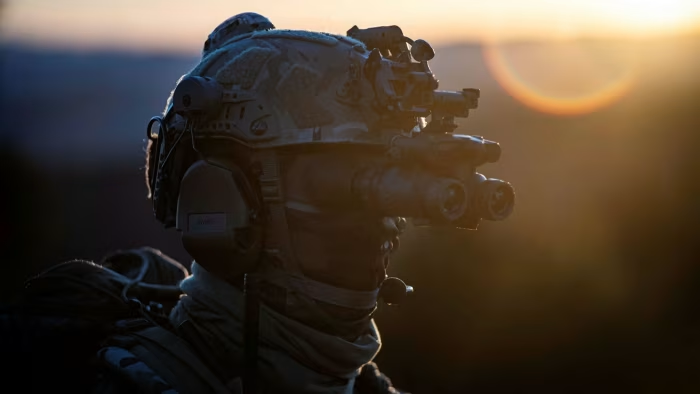Nato spending commitments are helping to make France’s defence sector a rare bright spot for the country’s struggling economy, with small companies benefiting as well as bigger businesses.
France boasts large defence companies including Dassault, Thales and Safran, but the fortunes of Exosens, a specialist in light-amplification tubes, illustrates how smaller businesses are also benefiting from greater defence spending. The maker of technology behind night-vision goggles is now valued at about €2.2bn after a stock surge this year.
At a tour of the Exosens factory in south-west France, chief executive Jérome Cérisier said he was preparing for an increase in longer-term orders, as Europe reckons with the need to bolster its defence capabilities.
“We’re at a major geostrategic turning point and even an end to the war in Ukraine will not fundamentally change that situation,” he told the Financial Times.
The Banque de France has identified the defence sector as one of the few drivers of business investment in the stagnant French economy amid Europe’s response to US President Donald Trump’s call to raise defence spending.
Exosens made its market debut in June 2024 just days before President Emmanuel Macron called snap parliamentary elections, shocking France and cooling business activity. While the country’s SBF 120 stock market index has been largely treading water since then, Exosens stock has almost doubled.
The company’s sales rose 20 per cent in the first half of the year to €225mn, with operating profits also up a fifth to €27mn. Key clients include the German military and Greek night-vision goggle maker Theon.
Other small French defence companies to benefit from investor interest include Exail Technologies, a provider of marine navigation systems and drones, whose shares have risen about 420 per cent this year, as well as private firms such as drone producer Delair and MC2-Technologies, which makes high-frequency technology aimed at neutralising drones.
MC2’s deputy director Alexandre Sibon said the company would increase revenue by 30 per cent this year, from a low base of €15mn, as Nato countries invest in “electronic warfare”.
He said there were plenty of announcements of support for the company: “We’re waiting for that to translate into orders.”
While Exosens does not have major contracts with the French military, Macron has set a long-term goal to double the French armed forces’ budget to €100bn a year. Although stretched public finances will make that difficult, the vast majority of spending will flow to French defence companies.

At its factory, Exosens demonstrated its latest generation of light-intensification tubes installed in goggles that bathed pitch-dark demonstration rooms in a greenish tinge.
The tube works by converting light to electrons, multiplying these electrons with a specially designed plate and converting them back into light when they hit a phosphorous screen. The resulting image was a 30 per cent improvement in quality compared with previous products, the group said.
At up to €4,000 per tube, the so-called 5G product would cost more than existing technology, but had already received 5,000 orders and been adopted by special forces units, Exosens said this month.
“If you need to see 20 metres further in front of you than others, a few hundred euros is not the question. Demand will be there,” said Frédéric Guilhem, chief commercial officer of its night vision business, which makes up about three-quarters of the company’s sales.
Exosens said its technology was favoured by European buyers because no parts were made in the US, meaning it did not depend on export licences from Washington, unlike similar technology by its US competitors Elbit America and L3, the company said.
“It’s possible Americans have products that are comparable but they are not available [to Europe]. We are the only ones able to offer them . . . the US doesn’t want to send the same thing that the US armies have,” Guilhem added.
Aurélien Sivignon, equity analyst at ODDO BHF, said Exosens’ non-American supply chain was a major “competitive advantage” but it would need to grow its capacity to meet demand. The company is investing in expanding manufacturing at its factory in Brive as well as building a US presence.
Such expansion means betting on sustained increases in defence spending. Companies such as Exosens are still waiting for more clarity on the scale of Nato countries’ investments, but investors are already swinging behind the European defence sector. French lender BPCE became the first European bank to issue a bond dedicated to defence companies worth €750mn earlier this month.
Philippe Jeanne, BPCE’s head of financial management, said there was no “reticence” from investors, compared with the previous discomfort with defence investment over ethical concerns. “It’s not just war in Ukraine. It’s also the disengagement of the US . . . it obliges everyone to adapt,” he said.
Exosens chief executive, Cérisier, is also confident of continued growth for the company as Europe boosts defence spending, which he says has been lacking: “I think there has been a profound wake-up call and that will lead to significant higher defence activity in the long-term.”
